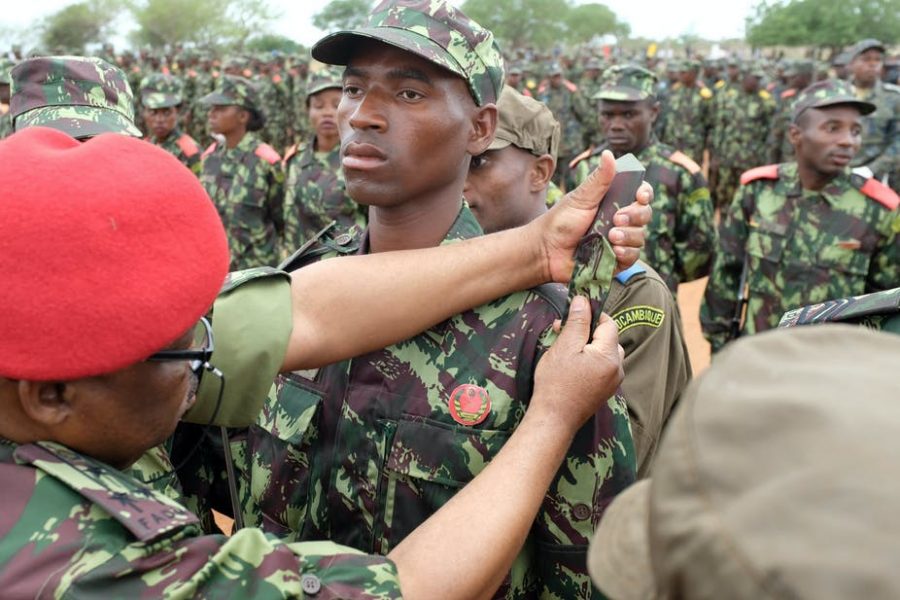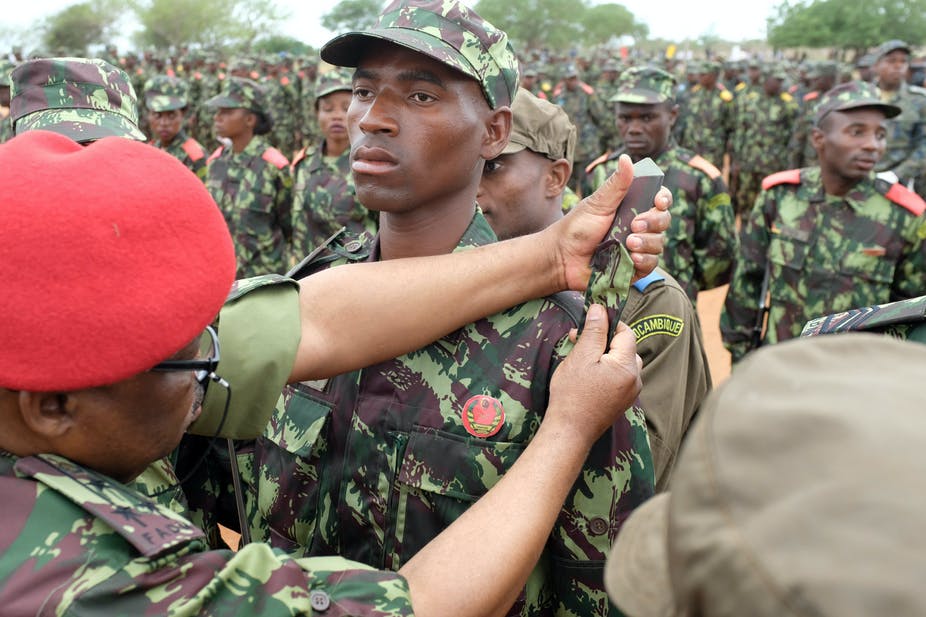
Why South Africa Has a Keen Interest in Extremist Violence in North Mozambique
A growing insurgency in the northern parts of Mozambique has caught the attention of conflict analysts and observers worldwide. There is now even a possibility that the South African National Defence Force might become involved in the most northern Cabo Delgado province, with a view to ending the deadly violence and litany of atrocities, abductions and destruction of […]

A growing insurgency in the northern parts of Mozambique has caught the attention of conflict analysts and observers worldwide. There is now even a possibility that the South African National Defence Force might become involved in the most northern Cabo Delgado province, with a view to ending the deadly violence and litany of atrocities, abductions and destruction of infrastructure.
Should the South African government decide to send in its military, the main aim would be to focus on the violent activities of an extremist and militant Islamic group, Ahlu Sunnah Wal Jammah. It is also locally known as Al Shabaab, even though it has no connections with the Somali movement of the same name. The group aims to establish its own mosques and madrassas to enhance the spread of its radical dogma.
Ahlu Sunnah Wal Jammah started as a religious sect which turned into a guerrilla group. Initially its goal was to impose Sharia law (Islamic law) in Cabo Delgado. It rejected the state’s schooling, health system and laws, which resulted in much tension in the province. Some analysts argue that the movement is motivated more by greed than by dogma or grievance: that it is making millions of dollars a week through criminal activities relating to mining, logging, poaching and contraband.
Be that as it may, many of its members appear to be socio-economically marginalised young people without a proper education and formal employment. They have been joined by young immigrants in a similar marginalised position. It is estimated that the movement’s members are organised in tens of small cells along the coast of northern Mozambique.
There is rightly widespread concern over these developments. Should South Africa – and specifically its defence force – get involved, it would certainly be venturing into a highly violent and complex landscape, requiring a counter-terrorism type of operations.
Such operations are always highly challenging. Countering terrorist and insurgent forces in Mozambique could be as challenging as the protracted operations against Boko Haram and Al Shabaab, the militant Islamist sects that operate predominantly in Nigeria and Somalia, destabilising large areas with their terror campaigns.
Why should there be serious concern over the situation in Mozambique?
Mozambique borders Tanzania, Malawi, Zambia, Zimbabwe, South Africa and eSwatini. Four of these six countries are landlocked, and hence depend on Mozambique as a gateway to global markets. Events in Cabo Delgado could thus threaten regional stability.
Even though Mocímboa da Praia, which is regarded as the headquarters of the extremists, is about 2,500km from South Africa, the group nevertheless poses a challenge to the country too. After all, Mozambique has strong economic ties with South Africa as the region’s economic engine. Regional stability is certainly in the interest of South Africa.
From a South African standpoint, four main issues stand out. These are: the danger of the spread of Islamist extremism so close to home; the strategic importance of the area under siege; weakness of Mozambican security forces; and combating organised crime.
Violent extremism
This is the first case of violent extremism of this kind in southern Africa. It is also the first manifestation of a militant movement which is associated with the Islamic State of Iraq and Syria, and the notion of a jihadist insurgency.
Until recently, acts of terror conducted by extremists in southern Africa were confined to Tanzania and Zanzibar.
The death toll and displacements of Mozambican locals in Cabo Delgado are difficult to verify. But reports indicate that more than 1,000 people have died and about two million are affected by the crisis overall.
Secondly, in recent years massive offshore natural gas deposits have been identified, drawing some of the world’s biggest energy players. Offshore exploration in the Cabo Delgado area is among Africa’s three largest liquid natural gas projects.
Investments of billions of dollars have already been made, but an escalation of violence is putting the future of these investments at risk.
These projects could be of major importance to poverty alleviation in the country. Poverty affects most of those in rural areas with low levels of formal education. Economic activity in Mozambique has improved in recent years and has the potential to strengthen in the foreseeable future. But much will depend on the megaprojects in Cabo Delgado, debt restructuring, COVID-19, macroeconomic stability and improved political and economic governance, among other key factors.
For decades, South Africa has experienced an illegal influx of Mozambicans due to development challenges in their country. Thus, economic, political and social development in Mozambique are of the utmost importance to South Africa, which is battling massive poverty and unemployment of its own.
Although exploration in Mozambique is offshore, support facilities are onshore and most vulnerable to attacks. The foreign companies with their massive investments feel threatened, especially now that final investment decisions have to be taken.
South Africa has another interest in these developments. The South African energy and chemical multinational Sasol has invested heavily in gas exploration projects since 2014.
The arrival of foreign companies has led to deep discontent among local people who are deeply aggrieved by their activities. They had to relocate to make way for the infrastructure development, amid complaints about the compensation they received. They’re also aggrieved that they have been resettled inshore, away from the coastal fishing areas.
These factors further complicate security challenges in the very delicate social landscape. Moreover, the insurgents can easily exploit local grievances as matters play into their hands.
The Mozambican military and police have proven to be no match for the militants. They have been unable to prevent them from taking the northern strategic town of Mocímboa de Praia, as well as invading a town near Quissanga.
To counter the growing insurgency, the Mozambican government has contracted the Wagner group, a private Russian military company, to assist government forces. But the situation appears to have gone from bad to worse.
A South African security group, the Dyck Advisory Group, was also allegedly assisting the Mozambican government.
A fourth cause for concern over dynamics in the Cabo Delgado province relates to organised crime. The area is a major conduit for smuggling drugs and other contraband. The volume of heroin produced and shipped from Afghanistan along a network of routes, via East and southern Africa, has increased considerably in recent years.
Cabo Delgado is a key point for smuggling drugs, wildlife, timber, gems and gold. The insurgency makes it more difficult to enforce the law in the province.
No choice
Operations aimed at countering Islamist extremists tend to continue for many years. Success at curbing violent terrorist attacks requires careful and long term responses.
Ideally, these should comprise a mixed set of interventions, including social reform, economic development and varying degrees of military force.
South African political involvement is now almost inevitable as the Southern African Development Community has already undertaken to help Mozambique in its fight against the insurgency. This makes it highly likely that South Africa’s military forces will somehow get involved.
Professor of Political Science, Department of Political Studies and Governance, University of the Free State. This article first appeared in The Conversation.
UPDATE Nov 2020: About 50 people beheaded in Mozambique football field execution
WATCH CARTE BLANCHE MOZAMBIQUE VIDEO, SEP ’20: The Ignored War: Islamic State in Southern Africa?
https://youtu.be/jW5dwZ71NWY
If you’re in SA – you can watch Carte Blanche on DStv Now.
If you’re living abroad – you can stream #CarteBlanche from Tuesdays, plus thousands of other popular local South African shows & movies by subscribing to Showmax International. You can try it FREE for 14 days.
